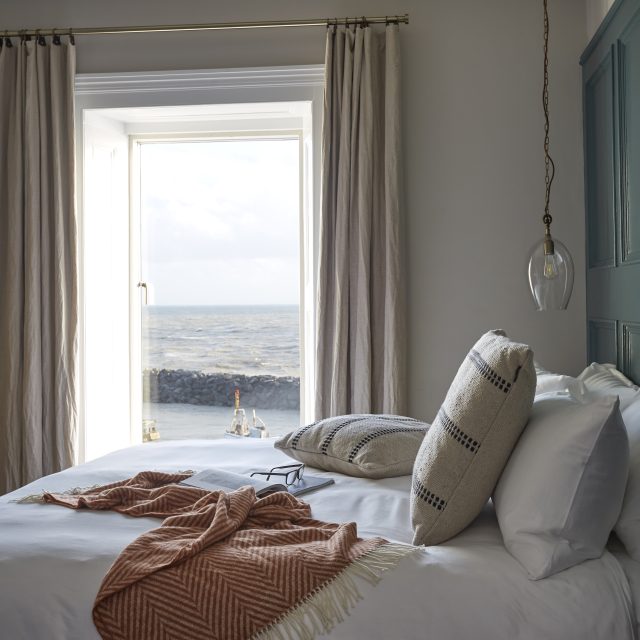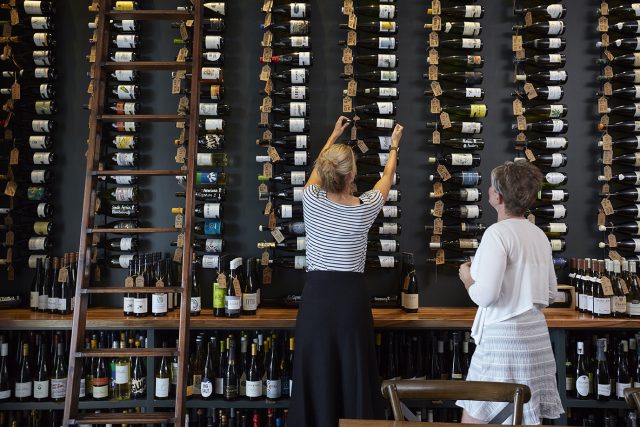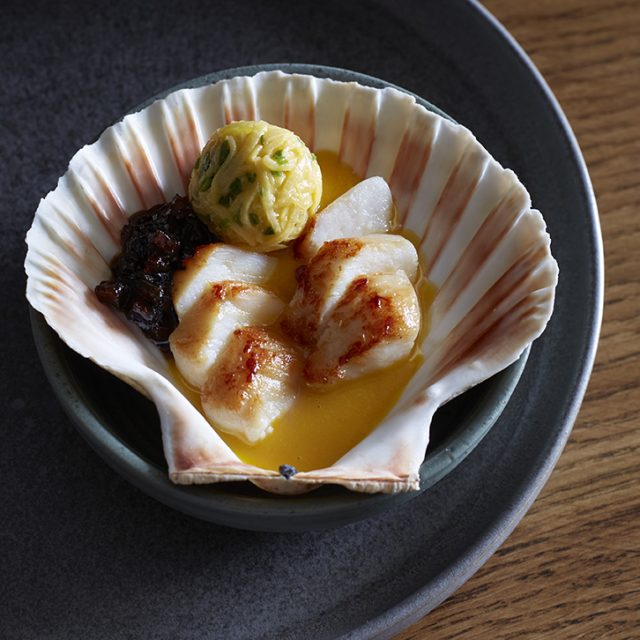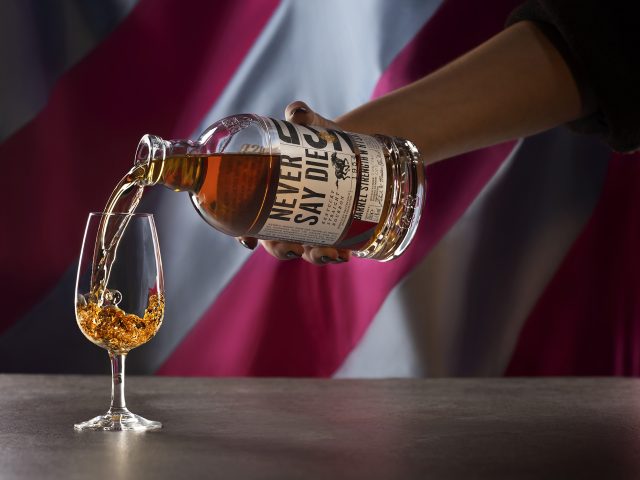This website uses cookies so that we can provide you with the best user experience possible. Cookie information is stored in your browser and performs functions such as recognising you when you return to our website and helping our team to understand which sections of the website you find most interesting and useful.
Unfiltered: Tom Fahey, The Terrace Rooms & Wine
The co-founder of the Isle of Wight’s most sophisticated boutique wine destination talks to Douglas Blyde about indelicate decanters, why restaurants should stop talking about “local produce”, and the hurt enabled by Tripadvisor.

What is The Terrace Rooms & Wine?
We are a little a hotel by the sea in Ventnor, Isle of Wight. At our heart is a “wine library” with custom-built ladders, sea views, bottle-lined walls, a single huge oak table and about seven hundred listings. As well as our six beautiful, sea-facing rooms, by day we are a wine bar and shop. In the winter we open an evening restaurant. Where some hotels simply have a competitive wine list, we are an actual wine hotel in the truest sense with a group wine tasting included in every stay, every night.
What was it before?
A crumbling guest house where no one had stayed for about five years other than the owners. The building itself was built in the 1840s as a home for the local rector and is a landmark of the Ventnor Bay skyline which we’re incredibly proud to have restored. The Italianate style inspired Prince Albert in the design of Osbourne House. Which for those with no local knowledge was Queen Victoria’s Isle of Wight residence.
Who is the chef?
I am, although I am reticent to call myself a “chef” because it gives me chronic imposter syndrome. I’m more of an eating obsessive with a good taste memory who can cook. From 2008 to 2020 I was a full-time guidebook inspector eating between 200 and 300 meals out each year. To get better at my job I undertook something like eighty stages in restaurant kitchens to learn more about how the food I was grading was produced. So I learnt to cook by being obsessed with eating and wanting to understand deliciousness. Before 2020 when my father-in-law purchased a restaurant he had nobody to run I’d never worked in a professional kitchen. I’d just eaten the output of thousands of them.
What has been your most lavish kitchen purchase, equipment-wise?
A second-hand Rational oven from a local hotel which closed. Ironically, it took three months to get it fitted and I’m still yet to make much use of it. My favourite kitchen equipment are mandolins, pressure cookers, Vitamixes and chamber vacs. Thermomixes can do one.
How do you match wines and dishes?
I tend more to match dishes to wines, which I think is the advantage of being both wine buyer and cook. So rather than saying “chef’s made a dish, how do I balance/complement it?” I look at the flavours in different wines and say, “Can I get these ingredients on the Isle of Wight and create a dish which mirrors the wine?” This has led to pairing Island dairy beef, stuffed Padrón pepper and a eucalyptus and berry vinegar sauce with various Coonawarra Cabernets; creating a warm tartar sauce from elderflower vinegar-pickled asparagus and salted gooseberries which has an almost identical flavour profile to barrel-fermented sauvignon; and creating a sauce from venison blood, smoked cherry, beetroot juice and venison stock which is redolent of the funkier end of Burgundy or even Saumur-Champigny.
How do you price your list?
I price wine with a huge amount of insanity because I feel ever more priced out of drinking good wine in restaurants and can’t bear to inflict the same horror on anyone else. I have only eight wines which cost over £100 to drink in and 30+ at £21, some of which have over five years of cellaring. Perhaps my overriding goal has been to cover as many stylistic bases as possible below £100 to drink in. I realise this is contrary to how wine sales and pricing typically work but we don’t have a demographic looking for rare or cult bottles, we have a demographic who are unsure. I build my list to guide them gradually into surety on the basis that affordability enables discovery.
How do you source wines?
I have listings from over 50 suppliers and actively buy small batches of wine from private cellars. When we started, the selection was based on wines we had enjoyed drinking in other restaurants – we sought them out and began working with the relevant supplier, but to do so we typically needed to list another ten or so of their wines due to delivery issues associated with the cost of ferries to the island. This led to our first experiences of trade tastings of which we attend over thirty each year, meticulously tasting through pretty much everything to find deliciousness and value. I have a hitlist of about ten weaknesses I want to eliminate from the list at any one time. For example, I am currently chasing more oxidative styles of rosé at a lower price point; we need to bolster our affordable sparkling rosés. We also need more everyday drinking oaked whites, our USA list needs to expand, and, finally, I want some old Jamet CDR which is no simple thing to acquire.
How does the off-licence aspect work?
We’re open for retail from 12-5pm every day. Buy a bottle, take it home. All wines have both an “in” and “out” price hanging on; the former is around 33% under typical restaurant pricing, the latter to an average UK retail. The small team are all trained to WSET Level 2 or above so there’s always some advice available.

Do you sell other vinous memorabilia?
We sell duck decanters. We did try to sell dick decanters too because we thought “dick or duck” was a nice marketing tagline, but the sample dick was too small to hold an entire bottle of wine. It got abandoned in the company car and eventually fell out of the door and smashed because who has a use for a small dick?
Do you rate the wines of England?
Yes and no. My experience of English sparkling is that differentiation across the sector is based more on brand than distinct regional or producer specialities. Yes, there are clear house styles, but can the average consumer or even wine professional necessarily detect them? Having done a lot of blind tastings, I think the answer is no. I find the market something of a minefield but prefer to stock entire ranges for a small number of producers than the entry-level wine or many producers. Hundred Hills is one of the few estates I’ve found which really stands out in the glass and at the same time has an approach to winemaking and growing which genuinely reflects its taste differential. The ripeness is remarkable.
Do you stock wines from the Isle of Wight, including Adgestone Vineyard’s “Kinda Lingers” rosé?
No, we don’t. It’s important to understand the history here. The Isle of Wight is the sunniest, warmest place in the UK. It has been possible to grow grapes effectively here for far longer than much of the country. At the same time, the Isle of Wight is and always has been a tourist economy. If you want to succeed in business you don’t make products for export, you make experiences and products for visitors. When Rosemary and Adgestone began making wine they did so with no market around them for the commercial sale of serious UK wine, but what they did have was a unique market for visiting a working vineyard. At the time this would have been a rare opportunity and a genuine attraction. Isle of Wight producers were incepted to sell wine at the cellar door but as a byproduct of their main commercial appeal as tourist attractions. This, I think, has seen the market for commercially serious English wine somewhat passed them by. Which in my view should not matter. They are lovely places to visit run by lovely people who bring visitors to the Island and make unique, historic wines. These wines are just not conceived for sale in a hotel with limited listing space aiming for an internationally relevant selection.
Do you deploy Coravin?
We don’t. Because our range is relatively low priced and we find little demand for rare or exclusive bottles we have seen little opportunity for it. We change our by-the-glass selection daily because so much of it is tied in with our daily residents’ tastings and our weekend wine pairings, all of which means a very rapid rotation of wines. When we open a bottle, it’s gone in a day or two.
Do you have wine fridges in the guest rooms?
Yes. Guests are free to stock them up, but their primary use is for fresh Briddlesford farm milk. Few things annoy me more than premium hotels which provide cartons of sterilised milk as standard.
What is your favourite table in the house, and why?
The big one in the wine room. As we have only one table in there no one can complain about having a bad one. The pergola tables for the wine bar with the views of the beach are amazing on a sunny day but I prefer to be surrounded by wine.
What wine style or grape could you happily live without?
Provence rosé. This bloody stuff has a lot to answer for in confusing consumers about sweetness in rosé styles. So much of it is characterless and built on brand more than substance.
And what style or grape deserves to be put in the spotlight?
New Zealand Pinot Gris and Gewurztraminer achieve the most incredible balance of ripeness and full flavour to ultra-fresh acidity. They are hugely underrated. Barrel fermented rosés deserve a greater market share. With Clos Cibonne as the model, these may be richer and not always the quaffable summer plonk consumers think they want, but the richness, complexity and ripeness are such a joyous discovery for many.
What ingredients do you love, and abhor?
I don’t intrinsically dislike any ingredient as such, but two things irk me. There is a proliferation of pre-prepared Japanese ingredients and seasonings at the fancy end of UK dining right now. I do wish chefs would try to establish their own cooking styles rather than feel they need to jump on a bandwagon. I blame the media for this, not the chefs who should rightly call out trends which add nothing to the diner’s experience and homogenise it utterly. An even more particular bugbear, however, is why anyone running a restaurant feels some deep-seated need to talk about local produce when they barely use any. Local produce isn’t better by definition. Consumers need to accept this, and journalists need to accept this. Stop praising local produce on instinct especially when it isn’t even local.

I remember when I was writing about restaurants for the first time, chefs would bang on and on about local produce, but when it came to writing about what they were using, real examples were few and far between. You might find the odd cheese, but they’d never met the cheesemaker. Unless we get incredibly lucky we’ll barely ever have island-landed fish on the menu in Yarmouth and nor, to any scale, does anyone else on the Isle of Wight. Anyone who cares about high quality is buying from “Flying Fish” yet, if you didn’t know, you’d believe we were landing enough monkfish to feed 3,000 tourists a day in summer. The reality is no one on the Isle of Wight lands monkfish. We have no commercial fish market and very few fishing boats, none of which operate in the deep sea. So why not big up the quality of your fish (because Flying Fish are great) rather than try to pass it off as local? Restaurants should not be afraid to challenge silly consumer and guidebook perceptions propagated by lazy food media and habit.
How do you celebrate the larder of the Isle of Wight?
I cook with nothing but Island produce for our wine room dinners. It’s not marketing – for these dinners only sugar, oil, salt, and vinegar are imported. It’s an approach which has seen me labelled obsessive, crazy, and belligerent, as well as many other “charming” epithets, but my goal has been to focus my efforts on ingredients as much as cooking. All my main produce is bought directly from the farm, field or boat. All meat is butchered by me from whole animals. We’ve created unique ingredients like Island dairy beef which didn’t exist previously, and revived the likes of huss, whelks and flounder – products which are, in themselves, as good as bass or Dover sole when sourced and treated with care. I have a year-round preservation programme with jars crammed full of apricots, gooseberries, cherries, asparagus, rhubarb, citrus, eucalyptus, ginger, wild garlic, alexanders, Sichuan pepper, salt fish, and even prickly pear cactus, much of which is grown for us at Ventnor Botanic Gardens where the microclimate supports crops which exist nowhere else in the UK. When you eat with us you will get a taste of only what’s produced around you in a unique climate.

What is The Terrace?
The Terrace is why I’m on the Isle of Wight and why I’m in hospitality. My father-in-law acquired part of the lease, and then the whole lease in late 2019. I leant a bit of advice in the planning phase then somehow found myself hiring all the staff, writing the menus and, on opening, cleaning the fryers and cooking the food. We were named third best UK seaside restaurant in The Times about a week after opening off the back of the first lockdown and the place went nuts. This meant my wife, Ashley, had to quit her job running the cookery school at Thyme and move into Daddy’s spare room with me to run the place together. It’s a 100-seat restaurant overlooking Yarmouth harbour. I would have turned it into a high-quality pizza place, but the family run it as a democracy and I was outvoted, so I suppose I’d describe it as a moderately ambitions, creative, modern British bistro with incredible sea views. As well as driving me and my in-laws nuts, what I think it has done is to allow Ashley and me to contribute to the quality of hospitality teams on the Isle of Wight. We are both obsessive about great service and food, and while I am good at creating systems and training, she is amazing at nurturing teams to embrace them. While we have certainly lost staff during our four years of operating, I know those team members have gained a great deal of knowledge around standards, warmth and systems in our employ which makes hospitality better on the island wherever they end up. I’m proud that The Terrace has allowed us to contribute to this.
Other than at The Terrace, and Terrace Rooms & Wine, are you consulting on other wine lists on the island?
We’re working on it. Given we opened Rooms & Wine so we could drink out better a huge part of that goal should be to influence other wine offerings. I do find this tricky as having too many steps in the supply chain isn’t good for margins or consumers, and oddly wine wholesale is hugely competitive on the Island which leads, unfortunately, to a lack of influence for suppliers in challenging the Pinot Grigio, NZ Sauvignon, Argentine Malbec, Provence rosé, French Merlot monotony which puts consumers in their wine comfort zone yet rarely delivers any value or helps drives the development of wine knowledge in teams. I think we will have our first wine list this year, hopefully with more to follow. We do have some very attractive corkage arrangements around Ventnor, so if you’re finding price/quality lacking we can sell you a great bottle to take to dinner at one of our partner restaurants with only £15 corkage.
Do you prefer an aperitif or digestif?
I just buy bottles of wine. If pushed I’d have a nice old Calvados.
Who handles the spirit selection?
Ashley and I do this together. We love Isle of Wight Gin Company who share our philosophy of utilising the Isle of Wight climate to create unique products. Almost all their botanicals are island-produced and they don’t export to the mainland, so we have a truly unique, delicious product worth travelling for. We have quite a bit of old Calvados, the wonderful Dima’s Vodka from Ukraine, which is dangerously clean and fresh, I am particularly enjoying Lionel Osmin’s range of vintage Armagnac right now. We have recently added Never Say Die Bourbon, being an English take on Bourbon which drinks with a rich delicacy belying its punchy 60.6% alcohol.

How many coffees do you consume per day?
Three. Two 50/50 almond milk/semi-skimmed flat whites and one double espresso. I am trying to reduce my saturated fat intake as would you believe after 15 years of three meals out a day I have cholesterol literally pouring out of my eyes? Seriously, I do.
Do you think TripAdvisor is an unimpeachable resource?
No, it’s appalling. Before I ever ran a restaurant I did a thing called #noreceiptnoreview which made national media outlining all the productive reasons why review sites need to make reviewers both visible and accountable for their content. TripAdvisor is basically a weapon for the worst kind of guest to use against real, actual people who work in restaurants. It is convenient for reviewers to visualise restaurant staff as part of a faceless business entity competing for their “scores” yet this is not what they are. They are actual people who can be publicly shamed without a thought by diners they have done nothing to consciously hurt or upset. I would urge disappointed consumers to raise issues at the time for immediate redress, or at the very least e-mail privately afterwards. If a restaurant ignores you or shirks justified responsibility at this stage, take it online, otherwise, remember that dining out is ultimately about enjoyment, something I believe 95% of restaurants work kindly and actively towards delivering. The only positive thing I can say about TripAdvisor is that well-constructed management replies are good for marketing – the tasting note on our Prosecco still references my most viral retort.
If you could have a superpower, what would it be?
Winning awards. I really think we deserve some but I’m quite shy, hate publicity, am old, live on an island and have never worked anywhere in hospitality. This all seems to hinder us which is very unfair on Ashley because I genuinely believe she’s one of the most gifted hospitality professionals in this country.
Tell us something surprising about yourself?
I have a really hot wife. No, I can’t believe it either.
Finally, who, from history, would you like to sit down to lunch with, and what would you drink?
Mikael Jonsson from Hedone. We’d also share cooking duties – half his dishes, half mine. He could roundly slag off all my food over a nice old Raveneau…
The Terrace Rooms & Wine – St. Augustine Villa, Ventnor, Isle of Wight, PO38 1TA; bookings@theterraceiow.co.uk; theterraceiow.co.uk

